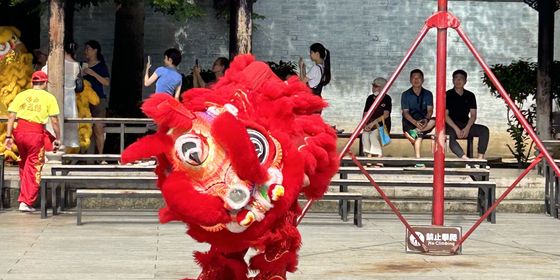Why is China going crazy for the Zhangqiu iron wok?
Deep in the hills of Zhangqiu, a suburban district Jinan, blacksmiths employ ancient techniques and more than 36,000 steps to hammer out non-stick, super heat-resistant iron woks that are now sold out everywhere online. But if you’ve never heard of the magic vessel until now, you’re not alone.
Even some locals of this Shandong community have said they weren’t aware of this cooking utensil, which used to be a simple local handicraft before it was featured in the first episode of A Bite of China 3, the phenomenal food documentary that has proven itself a adept taste-maker (literally) for the Chinese public.
A CCTV series focusing on Chinese food and culinary culture, A Bite of China aired its first season in 2012 and received an astounding rating of 9.3 on Douban.com. The second season, aired in 2014, received 8.4. The third season began broadcasting this year on February 19, amid the Spring Festival holiday season, with an episode on kitchen instruments including cutting boards, knives, and the handmade Zhangqiu iron woks.
Over footage of iron surrounded by a towering blaze and humble smiths hunched over their work, the documentary explained that the wok goes through 12 phases of manufacturing, is smelted 18 times at temperatures of up to 1,000 degrees Celsius, and gets beaten 36,000 times—”and not one less”—until the surface clear and smooth as a mirror. Overnight, the sales volume of the iron woks on Tmall shot up by 6,000 times, and Zhen San Huan, one of the official online retailer of the wok, reported to CCTV that people were scaling the wall of their factory to pot themselves a specimen.
This isn’t the first time that A Bite of China has made one of its subjects viral: sliced mutton barbecue in Xinjiang, Chongqing noodles, and delicate Yunnan food all owe at least some of their popularity to the broadcast. Even food-maker can became stars. Huang Guosheng, a Shaanxi man known for making huangmomo buns in the first season, became invited to endorse Xibei, a food chain based in Beijing.
China even has a proverb for this phenomenon: 洛阳纸贵, “Paper is expensive in Luoyang.” The phrase came from the biography of the writer Zuo Si in the 7th century Book of Jin. As the story goes, Zuo Si ‘s poems “The Three Capitals Rhapsodies” were so popular that every scholar in Luoyang was copying them down, and paper became very scarce and expensive. The proverb is now used to praise products, typically literary works, of high quality and wide appeal.
Similarly, speculates media, Zhangqiu iron woks have gone viral because they’re romanticized as a “pure” handicraft handed down the generations, which signifies quality and safety. Zhen San Huan, however, has said their entire stock of 2,000 iron woks have been cleaned out and it would take one to two years to fill all the orders they’ve been getting—due to the nature of the handiwork, they can make a dozen a day at most. Bloggers are also speculating that the stock could have been bought by scalpers, and fevered consumers could fall prey to “purchasing agent” scams or knockoffs—so, basically the usual downsides of being over-hyped by media.
The store has now said they are no longer accepting new orders, removed all the listings for woks in its online store, and posted an online urging an end to the craze. “We hope that you can apply for a refund and buy the wok after the fad subsides,” the statement reads, citing the pressure and distraction that media attention has brought on their artisans.
Interestingly, though wok fever is genuine, the show is getting slammed. The third season of A Bite of China only holds a rating of 4.0 on Douban. Factual errors, the promotion of a handmade Chinese medicine lipstick in Episode 4—a product with no safety guarantees—and an irrelevant segue to a sick Tianjin mom making her daughter Japanese-style bento have had viewers criticizing the show for becoming an advertorial. The showrunners have responded that they “knew innovation was risky,” but wanted to “feature not only the food and people, but also understand the cultural landscape and progress of the times.”
Does this mean wok fever was also just manufactured hype? It’s not clear, but until the fad dies, Jinan netizens are humorously commenting: “If a long-lost friend suddenly messages you, don’t be afraid, it may not be that you have to attend their wedding; they probably want you to buy them a Jinan knife and Zhangqiu wok.”













